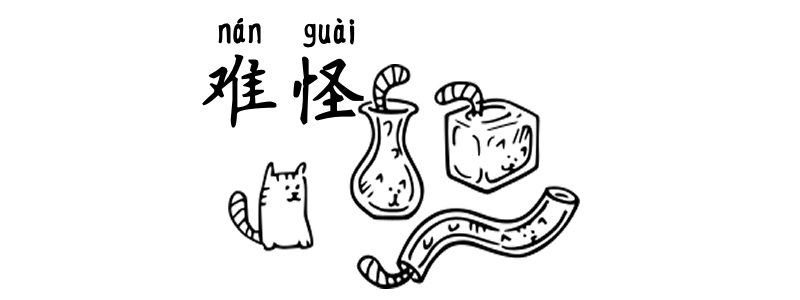Grammar point:
Both 难怪 nánguài and 怪不得 guàibude mean “no wonder” or “it’s no surprise.” It is used to express realization or understanding of why something happens, often after discovering new information or reasoning behind it. It can also convey agreement with a logical conclusion.
Structure
难怪 nánguài + Observation + 原来 yuánlái (是 shì) + The fact you just realized
Used when something becomes clear or makes sense after gaining information.
難怪弟弟哭得那麼慘,原來他的小狗走失了难怪弟弟哭得那么惨,原来他的小狗走失了
No wonder my brother was crying so hard. His puppy was lost.
難怪你中文說得這麼好,原來你媽媽是台灣人难怪你中文说得这么好,原来你妈妈是台湾人
No wonder you speak Chinese so well, it turns out your mother is Taiwanese.
難怪他今天沒來,原來他生病了难怪他今天没来,原来他生病了
No wonder he didn’t come today; turns out he’s sick.
難怪爸爸沒去爬山,原來下大雨了难怪爸爸没去爬山,原来下大雨了
No wonder dad didn’t go hiking. It was raining heavily.
Reason + 难怪 nánguài + Observation Fact
Expresses that the speaker now understands a situation.
這個蛋糕這麼好吃,難怪那麼多人排隊買这个蛋糕这么好吃,难怪那么多人排队买
This cake is so delicious; no wonder so many people are lining up for it.
這道題非常難,難怪他一時答不出來这道题非常难,难怪他一时答不出来
This question is very difficult, no wonder he couldn’t answer it for a while.
他是加拿大人難怪他不怕冷他是加拿大人难怪他不怕冷
He’s Canadian, no wonder he doesn’t feel cold.
聽說他中樂透了,難怪他最近又是搬家又是買車听说他中乐透了,难怪他最近又是搬家又是买车
I heard that he won the lottery, no wonder he changed his house and bought himself a new car recently.
You can always change the 难怪 nánguài to 怪不得 guàibude without changing any meaning. The only difference is 怪不得 guàibude is a more casual speaking form.
這小姐人美心又好,怪不得這麼多男孩子喜歡她这姑娘人美心又好,怪不得这么多男孩子喜欢她
This girl is beautiful and nice, no wonder so many boys like her.
下禮拜要考試了,怪不得他這幾天都熬夜讀書下礼拜要考试了,怪不得他这几天都熬夜读书
Next week is the exam, no wonder he has stayed up late these days to study.
他天天去健身房,怪不得身材那麼好他天天去健身房,怪不得身材那么好
He goes to the gym every day; no wonder he’s in such great shape.
难怪 nánguài In the Conversation
In daily conversation, you can drop everything and just simply reply 难怪 nánguài or 怪不得 guàibude.
A: 我肚子好餓我肚子好饿
I’m so hungry.
B: 因為現在已經下午兩點了因为现在已经下午两点了
Because it’s already 2:00 p.m.
A: 難怪难怪
No wonder.
Common Confusion
难怪 nánguài can also be 难 nán + 怪 guài, which means hard to + blame. In this case, the meaning is totally different from “no wonder.”
這很難怪機場,突然間的大霧讓所有飛機都得暫停起飛这很难怪机场,突然间的大雾让所有飞机都得暂停起飞
It’s hard to blame the airport, the sudden fog made all the planes have to suspend takeoff.
這也難怪他,沒有人知道今天會發生這種事这也难怪他,没有人知道今天会发生这种事
It’s hard to blame him, no one knew this would happen today.
Express “I Wonder” in Chinese
难怪 nánguài means “no wonder” and is used when you understand or realize why something happens. It’s not the same as saying “I wonder,” which expresses curiosity or uncertainty. In Chinese, if you want to say “I wonder,” you should use words like 不知道 bù zhīdào or 好奇 hàoqí instead.
不知道他現在在哪裡不知道他现在在哪里
I wonder where he is now.
我很好奇這道菜是怎麼做的我很好奇这道菜是怎么做的
I wonder how this dish is made.


